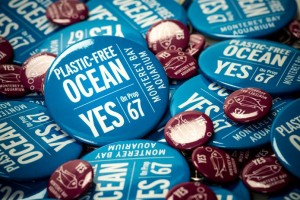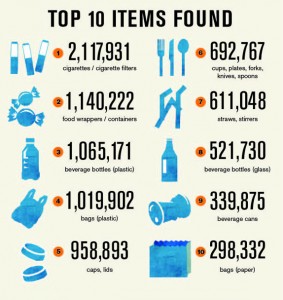November 8th was a bigly historic day. It was a great day. A great law was passed. California passed Proposition 67, which bans carry-out plastic bags in the state for good. It is the first state bag ban in the U.S. But, Proposition 67 is just a first step.
Our work is far from over if we want to solve our marine plastic pollution problem. Californians throw away about 16 billion plastic bags every year. That is 412 bags per person. Because they are so lightweight, plastic bags easily end up floating off trash pickup trucks and end up in the oceans.
Once in the oceans, plastic bags are deadly. They entangle sea creatures. Sea turtles and birds often choke on the bags when they mistake them for food. California’s statewide ban is a historic step in stopping our flow of plastic into the oceans.
But, it’s not enough. Every year the world adds about 8 million tons of plastic to the ocean, killing at least 100,000 ocean mammals and 1,000,000 sea birds. We need far-reaching efforts and regulations to minimize the plastic that is being produced. We can’t stop at bags. We must ban all single-use plastic.
Single-use plastic includes bags, straws, food packaging, disposable cutlery and plates, and beverage bottles. Single-use plastics make up almost two-thirds of the top ten items found during The Ocean Conservancy’s international beach cleanup.
France and the US have taken important steps in this direction. Last September, France became the first country to ban all single-use plastic cutlery, plates, and cups. After 2020, all disposable dishes will need to be made from biologically sourced materials that can be composted at home.
In 2015, the US also reduced its contribution to marine plastic pollution. Microbeads, a very small plastic ball used in products like face cleansers and toothpastes, were banned from cosmetics that can be rinsed off beginning in 2017. Toxic chemicals like DDT attach to microbeads, which can then be eaten by marine wildlife. Thus, microbeads become harmful to us when we eat tainted seafood. The congressional bipartisan Microbead Act will free our waterways of about eight trillion plastic beads every day.
More such bans are necessary because of the difficulty in disposing and recycling plastic in sustainable ways. A common misconception is that our plastic consumption is sustainable because it can be recycled. Captain Moore, founder of the marine research and education non-profit, Algalita, says that “plastics recycling is a myth. It’s a feel-good response to the problem and does nothing to help phase out single-use plastics—the real problem.” Indeed, only 6.5% of plastic is recycled in the United States.
Why is plastic so difficult to recycle? When plastic is not recycled with similar types of plastic, it can be contaminated and thrown out. This is difficult to do because of the variety of plastics with different chemical compositions and additives like dyes. And, there is confusion about what plastic can and cannot be recycled. So, plastic that shouldn’t be recycled together can get mixed. Contrary to popular belief, the numbers identifying the type of plastic are not necessarily indicative of whether the plastic can be recycled.
The life of recycled plastic is also short-lived, and thus not sustainable. Some plastic containers, like margarine tubs, cannot be recycled back into food containers because of sanitary restrictions. Plastic then becomes a longer-lasting good like carpeting. Critics of plastic argue that it has two lives, at best. Unlike glass and metal, which can be recycled and reused many times, plastic ends up in the dump or, too often, in the ocean a lot sooner.
In just the past two years, California has banned single-use plastic bags, France has banned single-use dishes and cutlery, and the US has banned microbeads. These are exactly the kind of far-reaching regulations that our oceans need, but they are just the beginning. These regulations have started us on a path towards a sustainable future, but we have a long way to before our oceans are plastic free.

